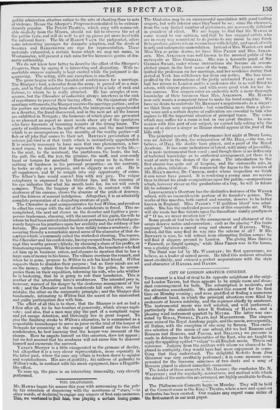THE ORATORIOS.
Mr. HAWES began his season this year with announcing to the pub- lic his intention of dispensing with the assistance of "stars,"—in other words, of declining to engage any singers of first-rate eminence. This, we ventured to itell him, was playing a certain Kish% game. The Oratorios may be an unsuccessful speculation with good leading singers, but with inferior ones7they?must be so ; since the choruses, from the very limited number of performers, are necessarily deficient in grandeur of effect. We are happy to find that Mr. HAWES iS come round to our opinion, and that he has engaged artists who are in every way competent to do justice to any music he may think fit to produce, artists whom we can hear with delight, and speak of with hearty and unfeigned commendation. Instead of Mrs. WOODYATT and Miss Dix as prime donne, we have Miss PATON and Mrs. ATKIN- SON. Mrs. Arxx xscov was well known to the musical public of the metropolis as Miss GooDALL. She was a favourite pupil of Sir GEORGE SMART, under whose instructions she became an accom- plished singer, in the best sense of the term. Five years since, she quitted the profession on her marriage, and her residence during that period at York has withdrawn her from our notice. She has since profited by the instructions of the justly celebrated PAER ; aiid we hail her return to London and to a profession she is so well fitted to adorn, with sincere pleasure, and with every good wish for her fu- ture success. Few singers enter an orchestra with a more thorough knowledge of their business than Mrs. ATKINSON. Mr. HAWES now only wants a competent tenor to make his band complete. We have no desire to underrate Mr. BENNETT'S acquirements as a singer: we think them very respectable : but something more than a pleas-. ing voice and a certain degree of cultivation are essential to him who aspires to fill the important situation of principal tenor. The voice which may suffice for a room is lost in our great theatres. In con- nexion with this part of our subject, we cannot help asking why the name of so clever a singer as HOBBS should appear at the jbot of the bills only?
The principal novelty of the performance last night at Drury Lane, was an Advent Hymn, the composition of Mr. HILL' —the son, we believe, of HILL the double bass player, and a pupil of the Royal Academy. It has some indications of talent, with many of juvenility. It is more instrumental than vocal ; and though there is no deficiency of technical knowledge as to orchestral arrangement, yet there is a want of unity in the -design of the piece. The introduction to the first chorus was quite out of keeping, and the violoncello solo, in such a place, ridiculous. We commend the fugue to the revision of Mr. HILL'S master, Dr. CROTCH, under whose inspection we think it can never have passed. It is rendering a young man no service thus to thrust his crude compositions upon the public,—compositions which, however clever as the productions of a boy, he will in future life be ashamed of.
LINDPAINTER'S Overture has the distinctive features of the WEBER school, with no inconsiderable portion of its founder's genius. The works of this maestro, both sacred and secular, deserve to be better known in England. Miss PATON'S "If guiltless blood" was admi- rable. She has the undivided possession of this exquisite air. Why will she waste her fine talents upon the threadbare namby pambyness of" 0 no, we never mention her " ?
Some proofs of bad taste in the arrangement and allotment of the songs deserve notice and correction ; such as the placing " Fm tante angoscie" between a sacred song and chorus of HANDEL. Why, indeed, did this song find its way into the scheme at all ? If Mr. BENNETT iS wise, he will refrain from attempting Italian songs: he will find it slippery ground in London. The giving Miss BRUCE "Farewell, ye limpid springs," while Miss PATON was in the house, was a glaring absurdity. The Band was led by Mr. WAGSTAFF ; his first appearance, we believe, as a leader of sacred music. He filled this arduous situation most creditably, and evinced a perfect acquaintance with the style and character of HANDEL and HAYDN.


















 Previous page
Previous page